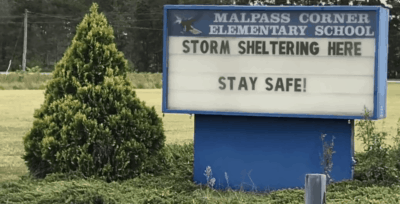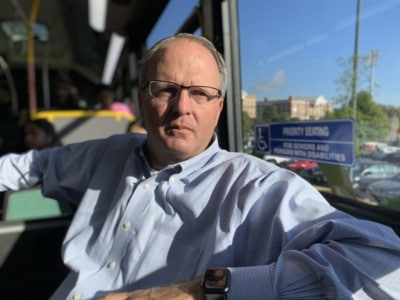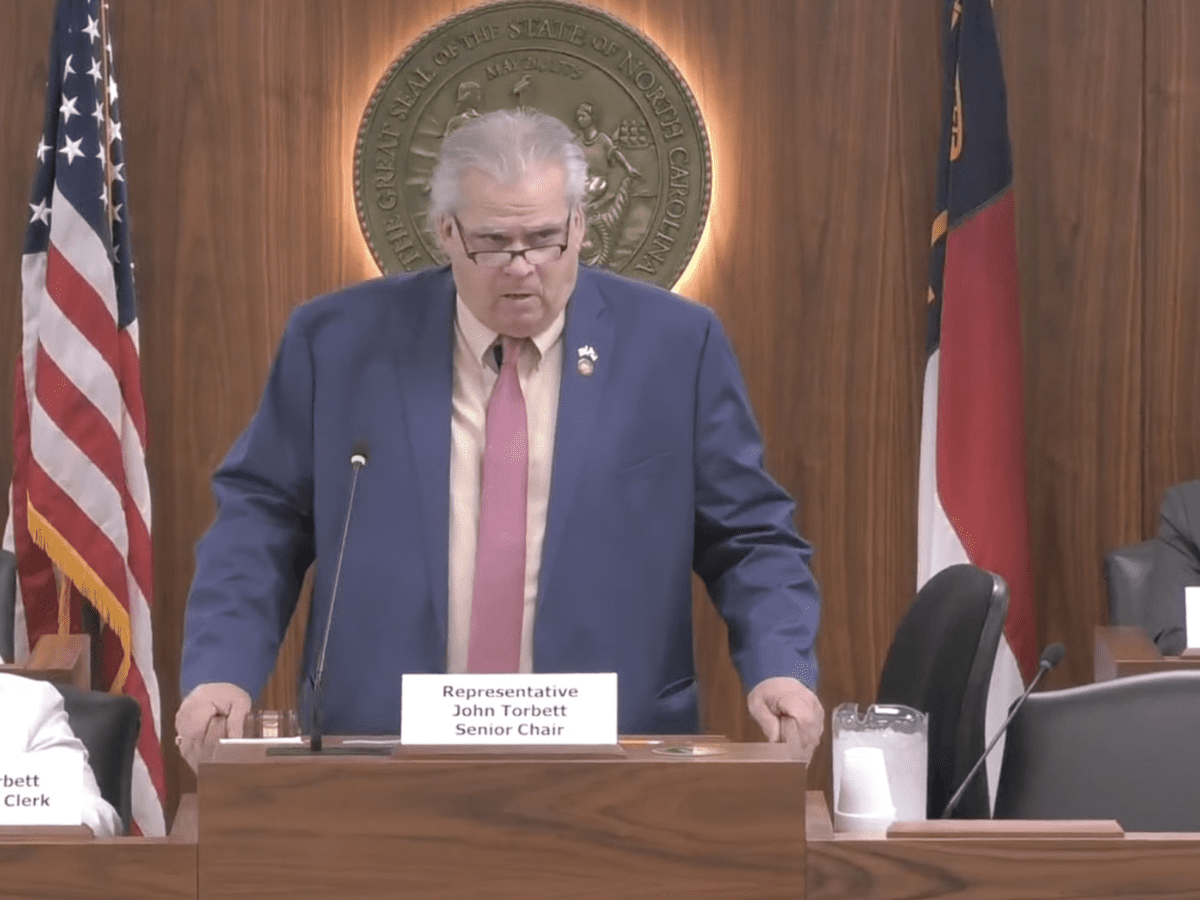
|
|
A special house committee on education voted to approve a report of six findings and recommendations for public education on Monday, ahead of next year’s long session of the state legislature.
The House Select Committee on An Education for North Carolina’s Future has met 12 times since convening in January. Their report calls for:
- A high-quality standard education.
- Increasing educator pay.
- Increasing instructional support personnel and access to alternative learning placements.
- Designing an assessment system that generates useful data.
- Adjusting the school calendar law to leave these decisions to local school boards.
- And amending the state constitution to grant greater authority to the state superintendent.
“They all kind of collectively work together as a foundation on a new system,” said Rep. John Torbett, R-Gaston, who is senior chair of the committee. “And with the basic findings … we’re asking this committee be bought back next year to further develop or further look into each and every one of these findings in more depth and to define outcomes.”
The report doesn’t have all the details about how these recommendations would work, but it includes information from each of the committee’s meetings. Keep reading for a breakdown of each recommendation.
A ‘high-quality standard education’
The committee found that students should receive a “high-quality standard education” for the state to have an “engaged, well-educated public.”
The language does not specifically reference the Leandro case, but it introduces new terminology in a space where the Leandro Courts have already defined the constitutional right to education as representing access to a “sound, basic education.”
The report says a “high-quality standard education” includes English, math, science, history, arts, and career and technical education.
“Throughout their education, students should be developing critical thinking skills that allow them to engage with the world,” the report states.
The report recommends offering certain elective courses online and on-demand so that students can pursue interests outside of the instruction day, and also calls for “real-life and hands-on learning experiences offered through partnerships with community colleges and community stakeholders.”
In session on Monday, Rep. Rachel Hunt, D-Mecklenburg, offered an amendment that would call for extending the school day to allow more time for electives. Torbett said he didn’t disagree with her, but he did not take amendments from the floor.
Related Reading on Standard of Education


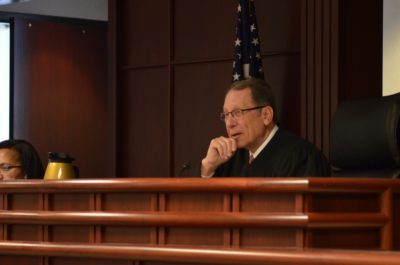
Increasing educator pay
The committee found that the state is having difficulty hiring and retaining qualified educators for every school, and notes that testimony before the committee indicated that increasing educator pay would alleviate that difficulty.
“For teachers, increasing pay would incentivize them to remain in the classroom rather than take an administrative role or leave the profession,” the report states. “The Committee also finds that educators have the greatest impact on students when they are focused on instructional duties, therefore non-instructional duties should be minimized.”
The report does not provide details on how to accomplish this, but Torbett said he is watching a proposal from the State Board of Education and the Professional Educator Preparation and Standards Commission. Here’s the latest on that.
“The committee didn’t have time to thoroughly research those outcomes,” Torbett said. “It is the hope that in the coming weeks and months, that we will have time to look at those outcomes that are suggested — not saying we’ll adopt them or not, just (that) it was hard to have a conversation on something that wasn’t complete yet.”
Hunt suggested increasing the number of teacher assistants to help in classrooms as well.
Related Reading on Teacher Pay

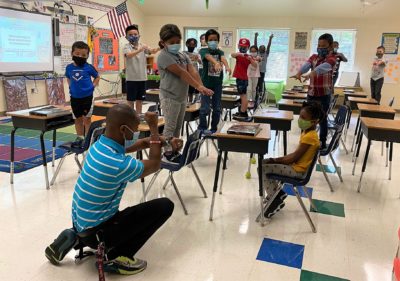
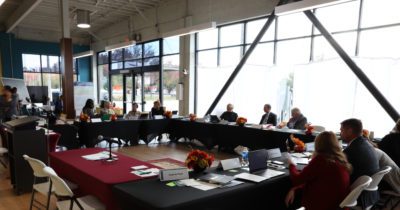
Instructional support personnel and alternative pathways
The committee found that students learn best in environments that are safe and supportive, that increasing instructional support personnel can foster school climates that allow all students to learn, and that providing character education to kids is important to create a school climate free from bullying and other distractions.
The conversation at the committee hearing on Monday focused on teacher authority to discipline students.
“We need to let teachers know that we do have their back and support in the classroom with the issue dealing with disciplinary issues,” Torbett said, “and also let the administrators know that they are to have the backs of teachers in the classroom without fear of repercussion — without any of that fear, because all of that is just nonsense.”
Torbett said some teachers might be afraid to discipline a student because they worry that reporting the incident or disciplinary measure will be a mark against the school.
Rep. Pat Hurley, R-Randolph, said disciplinary issues may be pushing teachers to leave the classroom.
“I think a lot of teachers who are leaving and who have left don’t feel that the administration has their backs and they are very concerned with how anything will be handled,” she said. “And when nothing is done, sometimes, it encourages them to leave the profession and we don’t need that.”
Neither the report nor the discussion during Monday’s hearing specifically addressed mental health or social emotional learning supports for students.
Related Reading on Discipline in Schools
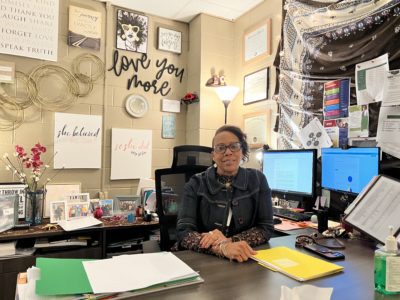


Designing assessment systems that generate useful data
The report found that student assessments that provide real-time information on student progress toward achievement would allow for all students’ educational needs to be met.
“The Committee finds that student mastery of a course should be determined by more than one data point, not just success or failure on a single, high-stakes final exam,” the report states.
There was no discussion on this finding during the hearing.
Related Reading on Assessments
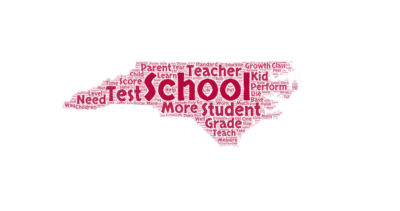


Changing school calendar authority
The committee also found that the current law requiring schools begin no earlier than the Monday closest to Aug. 26 hampers districts’ ability to operate on a calendar that best suits their communities.
“To better meet those needs,” the report states, “the Committee finds that local boards of education should be given greater calendar flexibility.”
At least three districts defied the calendar law this school year. On Tuesday, Union County’s Board of Education will vote on whether to defy the calendar law.
Rep. David Willis, R-Union, said “calendar flexibility has long been talked about and is sorely overdue,” but he encouraged including language that considers the community college system calendar because of a large number of dual-enrolled students.
Related Reading on School Calendar

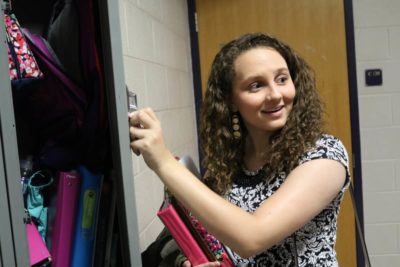
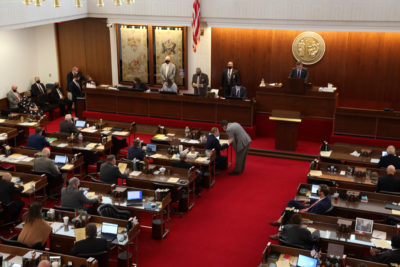
Granting state superintendent greater authority
The final recommendation, and perhaps most controversial, is to grant greater authority to the state superintendent of public instruction. Doing so would require the public to vote on an amendment to the state constitution.
“The Committee finds that the current division of authority between the State Board of Education and the Superintendent of Public Instruction creates a power struggle that causes more strife than support for North Carolina’s education system,” the report states.
Torbett said this was not intended to give or take powers from either entity, but rather designed to address the “litigious nature as we’ve seen in most recent of years past.”
However, since Superintendent Catherine Truitt took office in 2021, the parties have reported an improved working relationship.
The relationship between former superintendent, Mark Johnson, and the State Board was more strained. The genesis of that division, however, predated Johnson’s tenure — it began with the passage of House Bill 17, which also shifted authority among the State Board and state superintendent.
Hunt cautioned against amending the constitution for this issue, calling it complicated and saying most people in the general public do not understand exactly what the Board or state superintendent do.
“I just think it needs to be looked at very, very carefully,” she said. “There would have to be a huge amount of public instruction on what this constitutional amendment is, what it does, how it would affect your children. So I’m somewhat trepidatious about this particular finding.”
Related Reading on HB 17
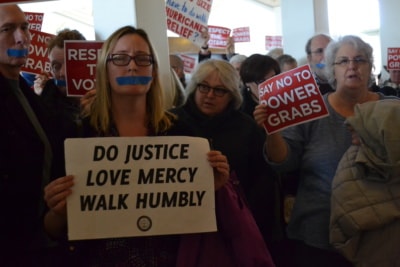
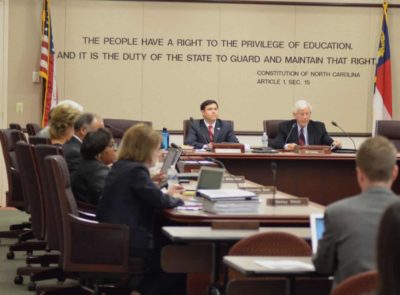
Read the full report here.
Recommended reading
